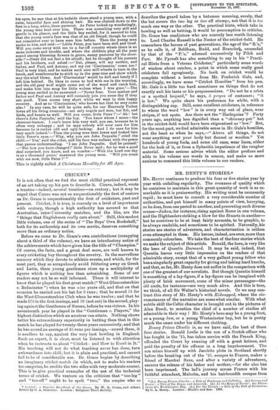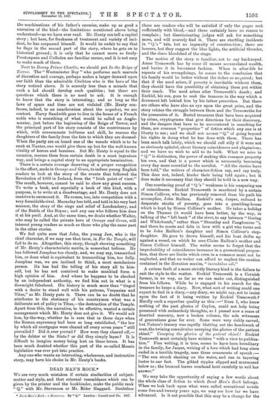MR. HENTY'S STORIES.*
Mn. HENTY continues to produce his four or five stories year by year with unfailing regularity. The evenness of quality which he contrives to maintain in this great quantity of work is as re- markable as it is praiseworthy. His writing must be necessarily rapid ; he must have to consult a very considerable number of authorities, and put himself in many points of view, hurrying, as he does, from one period to another, and presenting such diverse scenes—Judrea, for instance, rising against Rome in one volume, and the Highlanders striking a blow for the Stuarts in another— bat he contrives to be at least fairly accurate, to be graphic, to be always readable, and sometimes to be spirited. Naturally, his stories are stories of adventure, and characterisation is seldom even attempted in them. His heroes, indeed, are even more than commonly colourless. We take the beet of the four stories which we make the subject of this article. Ronald, the hero, is very like the hero of Quentin Durward. It may be said, indeed, that Quentin leaves very little impression on the readers of that admirable story, except that of a very gallant young fellow who has a singularly great capacity for giving and taking hard knocks, and that, so far, Mr. Henty does not suffer in the comparison with one of the greatest of our novelists. But though Quentin himself is something of a lay-figure, if a lay-figure can be imagined with plenty of brisk movement, some of the minor personages—the old uncle, for instance—are very much alive. And this is true, we think, of all Sir Walter's historical novels. Or we may con- trast this story of Mr. Henty's with Kidnapped, where the cir- cumstances of the narrative are somewhat similar. With what subtle skill the Celtic character is brought out in the pictures of Alan Breck, to mention the chief of a number of studies all admirable in their way ! Mr. Henty'e hero may be a young Scot, or a young Jew, or a young Westminster boy, but he is pretty much the same under his different clothing.
Bonny Prince Charlie is, as we have said, the best of these four stories. Ronald Leslie is the son of a Scotch officer who has fought in the '15, has taken service with the French King, offended the Court by running off with a great heiress, and paid the penalty of his offence in a long imprisonment. The son mixes himself up with Jacobite plots in Scotland shortly before the breaking out of the '45, escapes to France, makes a friend of Marshal Saxe, and after a variety of adventures, secures the release of his father and mother,—for she also has been imprisoned. The lad's journey across France with his faithful attendant, Malcolm, and his hairbreadth escapee from • (1.) Bonny Prince Charlie a Tale of Fontenoy and Culloden. (2.) Orange and Green a Tale of the Boyne and Limerick. (a.) In the R,eign of Terror the Adven- tures of a Westminster Boy. 14.) For the Tentyle a Talc of the Fall of Jerumlent. By O. A. Ronny. London Mackie and Son, 1888.
the machinations of his father's enemies, make up as good a narrative of the kind—the limitations mentioned above being understood—as we have ever read. Mr. Henty can tell a capital story ; but here, for freshness of treatment and variety of inci- dent, he has surpassed himself. It would be unfair to say that he flags in the second part of the story, where he gets on to historical ground ; it is only that he cannot move so freely. Prestonpans and Culloden are familiar scenes, and it is not easy to make much of them.
Next to Bonny Prince Charlie, we should put In the Reign of 2'crror. The " Westminster Boy " who performs such marvels of discretion and courage, perhaps makes a larger demand upon our faith than the admirable Crichton who is the hero of the story noticed above. It is scarcely less than a miracle that such a lad should develop such qualities ; but these are questions which there is no need to ask. It is enough to know that the story is interesting ; and as long as the laws of space and time are not violated (Ur. Henty con- fesses, indeed, to an anachronism about the noyadee), we are content. Harry Sandwith goes to live in the house of a French noble who is something of what would be called an Anglo- maniac, just before the beginning of the Reign of Terror, and the principal part of his story consists of the contrivances by which, with consummate boldness and skill, he rescues the daughters of the family from the fate to which they are doomed. When the party are on board one of tke vessels which is to be sunk at Nantes, one would give them np but for the well-known vitality of heroes and heroines. But Mr. Henty is equal to the occasion, rescues them from certain death in a most ingenious way, and brings a capital story to an appropriate termination.
There is a certain courage deserving of a proper recognition in the effort, made in Orange and Green, to induce young English readers to look at the story of the events that followed the Revolution of 1688 in Ireland, from the "Irish point of view." The result, however, cannot be said to show any great success. To write a book, and especially a book of this kind, with a purpose, is to write at a disadvantage, and Mr. Beaty does not contrive to surmount it. He comes, too, into competition with a very formidable rival. Macaulay has told, and told in his very best manner, the story of the siege and relief of Londonderry, and of the Battle of the Boyne ; and any one who follows him does it at his peril. And, at the same time, we doubt whether Walter, who may be called the private hero of Orange and Green, will interest young readers as much as those who play the same part in the other stories.
We feel quite sure that John, the young Jew, who is the chief character, if we may use that term, in For the Temple, will fail to do so. Altogether, this story, though showing something of Mr. Henty's characteristic merits, is somewhat tedious. He has followed Josephus too closely, and, we may say, transcribed him, or done what is equivalent to transcribing him, too fully. Josephns was, we are inclined to think, a most mendacious person. He has had the telling of his story all to him- self, but he has not contrived to make mankind form a high opinion of him. And where he happens to be checked by an independent authority, we find him out in what is a downright falsehood. His history is much more than "tinged with a desire to stand well with his patrons, Vespasian and Titus," as Mr. Henty puts it. There can be no doubt that he attributes to the obstinacy of his countrymen what was a deliberate act of policy in Titus,—the destruction of the Temple. Apart from this, the narrative, to be effective, wanted a certain management which Mr. Henty does not give it. We would ask him, by-the-way, whether he is sure that in those days when the Roman supremacy had been so long established, " the law by which all mortgages were cleared off every seven years " still Prevailed P Did it ever prevail P How were they cleared off,— by the debtor or the State P or did they simply lapse? It is difficult to imagine money being lent on these terms. It has been much doubted whether this part of the so-called Mosaic legislation was ever put into practice.
Any one who wants an interesting, wholesome, and instructive story, may have his choice in Mr. Henty's books.
























































 Previous page
Previous page